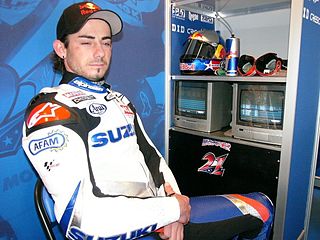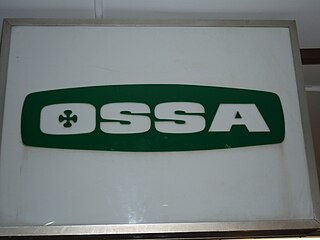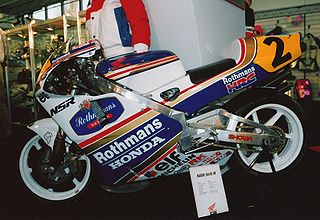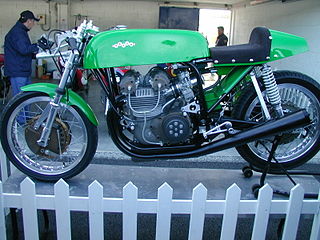Related Research Articles

Grand Prix motorcycle racing is the highest class of motorcycle road racing events held on road circuits sanctioned by the Fédération Internationale de Motocyclisme (FIM). Independent motorcycle racing events have been held since the start of the twentieth century and large national events were often given the title Grand Prix. The foundation of the Fédération Internationale de Motocyclisme as the international governing body for motorcycle sport in 1949 provided the opportunity to coordinate rules and regulations in order that selected events could count towards official World Championships. It is the oldest established motorsport world championship.

Aprilia is an Italian motorcycle manufacturer founded immediately after World War II in Noale, Italy, by Alberto Beggio. The company started as a manufacturer of bicycles and moved on to manufacture scooters and small-capacity motorcycles. Since in the 1980s, Aprilia has also produced large sportbikes such as the 1,000 cc V-twin RSV Mille and the V4 RSV4.

Giacomo Agostini is an Italian former professional motorcycle road racer and racing team manager. He competed in the FIM Grand Prix motorcycle racing world championships from 1963 to 1977, most prominently as a member of the MV Agusta factory racing team. Nicknamed Ago, he amassed 122 Grand Prix wins and 15 World Championship titles. Of these, 68 wins and 8 titles came in the 500 cc class, the rest in the 350 cc class. For these achievements obtained over the course of a career spanning 17 years, the AMA described him as "...perhaps the greatest Grand Prix rider of all time". In 2000, Agostini was inducted into the MotoGP Hall of Fame as a MotoGP Legend, while in 2010, he was named an FIM Legend for his motorcycling achievements.
Cagiva is an Italian motorcycle manufacturer. It was founded in 1950 by Giovanni Castiglioni in Varese, originally producing small metal components. Giovanni's sons, Claudio and Gianfranco Castiglioni, went into the motorcycle industry in 1978. The name is a portmanteau derived from the founder's name 'Giovanni Castiglioni' and the founding location, i.e. Castiglioni Giovanni Varese.

John "Hopper" Hopkins is a former motorcycle road racer based in the United States. During 2017 he raced in the British Superbike Championship aboard a Ducati 1199 Panigale for Moto Rapido Racing, but suffered injuries from a crash at the season-finale race meeting in October, meaning he could not participate during 2018. He has not made a full recovery, which has so far precluded hopes of a comeback, but he has become involved in rider coaching.

Gresini Racing is a motorcycle racing team competing in the MotoGP World Championship under the name Gresini Racing MotoGP as a Ducati satellite team, in the Moto2 World Championship as QJmotor Gresini Moto2, and the MotoE World Cup as Felo Gresini MotoE. The team also competes in CIV Moto3.

Česká zbrojovka a.s. is a Czech company producing forklifts Desta and components for the automobile industry, it is former firearms manufacturer, also known for making ČZ motorcycles. ČZ was established as a branch of the Škoda Works Armament in Strakonice, Czechoslovakia in September 1919.

Ossa was a Spanish motorcycle manufacturer which was active from 1924 to 1982 and from 2010 to 2015. Founded by Manuel Giró, an industrialist from Barcelona, Ossa was best known for lightweight, two-stroke-engined bikes used in observed trials, motocross and enduro. The company was known originally as Orpheo Sincronic Sociedad Anónima (O.S.S.A.) and was later renamed Maquinaria Cinematográfica, S.A..

The Honda NSR500 is a road racing motorcycle created by HRC and debuted in 1984 for the Grand Prix motorcycle racing's 500 cc class. Honda won ten 500cc World Championships with the NSR500 from 1984 to 2002, with six in a row from 1994 to 1999. With more than 100 wins to its credit, the NSR500 is the most dominant force in modern Grand Prix motorcycle racing. The 1989 NSR500 that won Honda's third 500 World Championship with Eddie Lawson exemplifies the overwhelming power, acceleration and raw speed that has always been synonymous with Honda's 500 cc two-stroke V4.

The 2002 Grand Prix motorcycle racing season was the 54th F.I.M. Road racing World Championship season. The season consisted of 16 races, beginning with the Japanese motorcycle Grand Prix on 7 April 2002 and ending with the Valencian Community motorcycle Grand Prix on 3 November.
The ELF 500 ROC was a motorcycle that competed in the 1996 and 1997 500 cc Road Racing World Championship.

Husqvarna Motorcycles GmbH is an Austrian motorcycle company with Swedish origins.

Pramac Racing is a motorcycle racing team competing in the MotoGP World Championship. The team was created in 2002 by Italian company Pramac. In 2005 Pramac Racing joined forces with Spanish d'Antin MotoGP to form "Pramac d'Antin" and in 2007 the team became part of the Pramac Group. After Luis d'Antin left the team in 2008, the team became known as "Pramac Racing". Their base is in Casole d'Elsa, Tuscany, Italy.

Paton is an Italian motorcycle manufacturer. In 1957 after FB Mondial pulled out of Grand Prix racing, Paton was set up by Giuseppe Pattoni and designer Lino Tonti.

Esponsorama Racing was a motorcycle racing team who formerly competed in the various categories of Grand Prix road racing from 2000 to 2022.

Red Bull KTM Factory Racing is the factory team of KTM active in the MotoGP World Championship supported by sponsor, drinks manufacturer Red Bull.
Grand Prix motorcycle racing sponsorship liveries have been used since the late 1960s, replacing the previously used national colours. With sponsors becoming more important with the rising costs in the motorcycle CC classes, many teams wanted to be able to display the logos of their sponsors as clearly as possible.

The Aprilia RSW-2 500 was a racing motorcycle made by Aprilia, which raced in the 500cc class of the Grand Prix motorcycle racing, starting from 1994 until 2000.

The RC250GP is a Grand Prix racing motorcycle designed and built by KTM for the Moto3 class, introduced in 2012. It is also used in the Moto3 Junior World Championship. The RC250GP is raced by KTM's factory racing program as well as supplied to numerous customer teams. The motorcycle is one of the most successful machines of the Moto3 era to date, having taken five constructors' championships, including a clean sweep in 2013 winning every one of the 17 races.
References
- ↑ "Race results - German Grand Prix". Crash.net. 23 July 2000. Retrieved 17 January 2019.
- ↑ "History – Paton – moto". Paton.it. Retrieved 17 January 2019.
- ↑ "Roberto Pattoni: Team Manager of the unlucky Paton outfit". Motogp.com. Retrieved 17 January 2019.
- ↑ "Paton PG 500 RC". Archived from the original on 2019-01-19. Retrieved 2019-01-17.
- ↑ "PATON PG 500 RC TT 07". Motorencyclopedie.nl. Retrieved 17 January 2019.